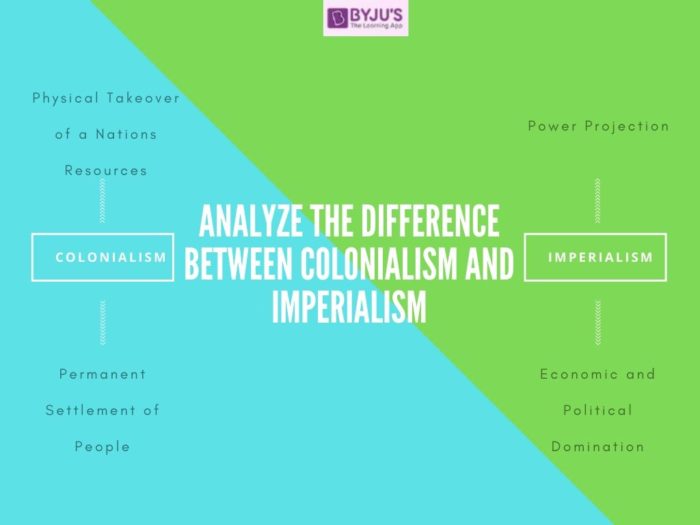Both Colonialism and Imperialism mean economic and political domination of the other. As a result, both are hard to differentiate at times.
Yet they are two words with totally different meanings. Colonialism is where one country physically exerts complete control over another country and Imperialism is formal or informal economic and political domination of one country over the other.
In a nutshell, colonialism can be thought of as the practice of domination and imperialism as an idea behind the practice.
Get over 100 difference between articles in the linked post.

Keeping the context of the IAS Exam in mind, this article will extensively highlight the differences between colonialism and imperialism
Aspirants should know the difference between a few more important terms that are linked below:
| Difference Between Democrat and Republican | Difference Between Democracy and Monarchy |
| Difference Between Democracy and Dictatorship | Difference Between Democracy and Republic |
Differences between Colonialism and Imperialism
| Colonialism |
Imperialism |
| Colonialism is when one country physically exerts its domination, either through a combination of war and diplomacy, over another country with a view to exploiting its resources | Imperialism is when one country is involved in creating an empire and expanding the borders in order to project its power. |
| In colonialism, there will be a movement of people to the new territory, becoming permanent settlers in the process | Imperialism is just about exerting control over the conquered regions either through direct governance or through indirect control mechanisms |
| Colonialism in the modern sense dates back to the 15th century when Europeans began to colonize large swathes of Asia and Africa | Imperialism is far older than colonialism dating back to ancient empires in history but is more commonly associated with the Roman Empire |
| Colony comes from the Latin word colonus which means ‘to farm’ | Imperialism comes from the Latin word ‘imperium’ which means to ‘command’ |
| Examples of colonialism are to be found in the takeover of India, Australia, Southern, and Central Africa by the British and Western and North Africa by the French | The Scramble for Africa in the 19th Century and the Chinese domination of Vietnam from 111 BC to 983 AD are examples of Imperialism |
Also, read the Difference Between Imperialism and New Imperialism to understand it better.
Imperialism and Colonialism are covered under the History segment of the UPSC IAS Exams. Aspirants can find the links to study this segment thoroughly below:
- NCERT Ancient Indian History Notes for UPSC
- NCERT Medieval Indian History Notes for UPSC
- NCERT Modern Indian History Notes for UPSC
- World History for UPSC Mains
- UPSC History Syllabus
- UPSC Mains History Question Paper (2013-2019)
Difference Between Colonialism and Imperialism – Download PDF Here
Frequently Asked Questions about Colonialism and Imperialism
How did imperialism lead to colonialism?
What are the effects of colonization?
Aspirants can become familiar with the general pattern of the IAS exam by visiting the IAS Syllabus page. For more preparation materials they can refer to the links given in the table below:
Related Links
| NCERT Books Free Download | UPSC Exam Pattern | NCERT Notes for UPSC |
| UPSC Calendar 2022 | UPSC 2022 | UPSC Cut Off |

Comments